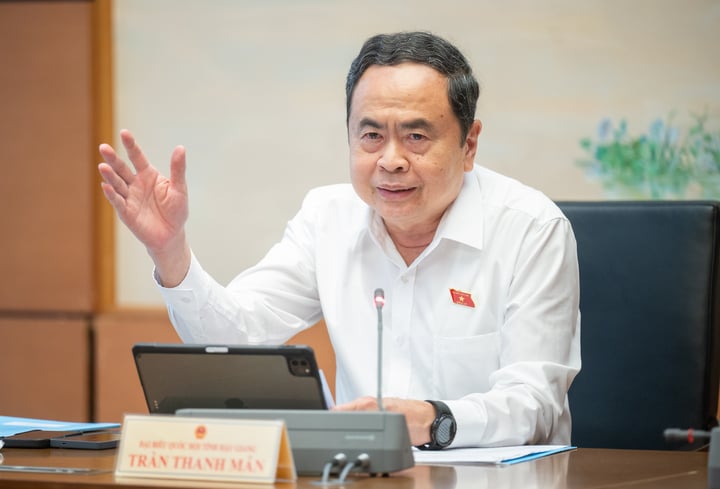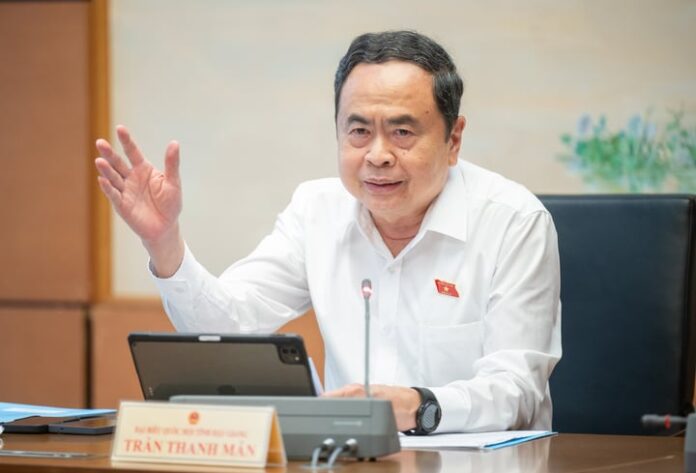During the group discussion this afternoon (May 10), Chairman of the National Assembly Tran Thanh Man stated that the Law on Planning, which was issued by the XIV National Assembly, along with the Government’s decrees and circulars providing guidance, has encountered numerous bottlenecks. Therefore, in this amendment, we need to be more cautious in our calculations, integrating, synchronizing, and linking national, provincial, and regional planning.
With the upcoming two-tier local government model, it is essential to establish a clear coordination mechanism between ministries, sectors, and localities in the formulation, appraisal, and implementation of plans. Additionally, there should be a focus on digital transformation and the application of artificial intelligence in planning.

National Assembly Chairman Tran Thanh Man speaks during the group discussion. (Source: Quochoi.vn)
Regarding the scope of the amendment, this planning law revision aims to facilitate the reorganization of the administrative apparatus towards greater decentralization and devolution. The National Assembly will make decisions, and the Government and ministries will devolve powers to local authorities, rather than having a list of projects decided by the National Assembly, requiring localities to work with ministries.
“This amendment to the Planning Law must involve substantial decentralization and devolution. The National Assembly will issue a framework law, the Government will issue guiding decrees, and ministries will issue circulars for local implementation, ensuring synchronization,” Mr. Man said.
The National Assembly Chairman particularly emphasized the importance of transparency and synchronization in planning. “It is necessary to stipulate matters such as public disclosure of planning information, consultation with the people, especially those directly affected by the plan; establishing a monitoring mechanism to ensure that the plan is not arbitrarily adjusted for local interests,” he stressed.
Recalling his experiences during visits to other countries, the National Assembly Chairman mentioned that each province and city had a planning sandbox with a long-term vision that was accessible to the public.
In contrast, in Vietnam, plans are often changed, added, or amended by the incoming secretary or chairman in the next term. As a result, planning lacks transparency and openness due to constant changes.
This issue requires careful consideration and enhanced enforcement and oversight mechanisms. Planning that is transparent and publicly accepted under the supervision of the people will be more feasible and effective, according to Mr. Man.
Concerning the procedure for adjusting national, regional, and provincial planning, Chairman Tran Thanh Man suggested streamlining the process by omitting certain steps, such as seeking approval for planning adjustments and conducting strategic environmental assessments. This would expedite the process.
However, he cautioned that adjustments that significantly alter the scale and content, such as changing land-use goals without strategic environmental assessments, could have adverse effects on the environment and pose risks to sustainable development.
Deputy Nguyen Ngoc Bao (Bac Ninh delegation) assessed that Vietnam’s planning system is highly complex, with three types of plans approved by the National Assembly, 39 types of sectoral plans at the national level, and 63 provincial plans approved by the Prime Minister. These plans have different purposes, criteria, and durations, making it challenging to ensure consistency and linkage.
“With such a planning system, how can we evaluate and ensure the consistency and compatibility of various plans with each other? This seems almost impossible,” Mr. Bao expressed his viewpoint.
Referring to information from the National Assembly’s supreme oversight on the real estate market and social housing, Deputy Bao mentioned that the oversight had pointed out one of the critical issues that needed to be addressed: the planning system and the legal framework for planning.
However, according to the deputy, the current Planning Law has not thoroughly resolved the practical difficulties encountered in the past. In the long run, there is a need for in-depth research and comprehensive reform of the planning regime to facilitate investment and socio-economic development while also fulfilling the requirements of resolutions on development strategies.
It is essential to determine whether planning serves as a rigid tool for state management or an effective instrument for socio-economic development, he added.
Expanding the Ecosystem: VPBank Gears Up for Accelerated Growth
At the 2025 Annual General Meeting of Shareholders, VPBank asserted its ambitious growth target of 30-35% annually over the period of 2026–2029. To materialize this strategy, the bank is set to enhance synergy within its comprehensive financial ecosystem, along with introducing two new pivotal pieces—life insurance and fund management.
A Special Alliance is Born: Equipping Vietnam with an Elite Force to Win the New “War”
“The FPT Chairman is pleased with the recognition of entrepreneurs as ‘soldiers on the economic front line’ as stated in Resolution 68-NQ/TW.
Why Techcombank Confidently Believes its Auto-Wealth Feature Stands Out Without Compromises
In the highly competitive landscape of Vietnam’s financial market, Techcombank has made waves with its innovative product, Auto Wealth, attracting over 3.3 million customers in just a year since its launch in January 2024. With its compelling message of “Relax and Let Your Money Grow,” this product has not only transformed how Vietnamese manage their finances but also set a new standard in digital banking.
The Secrets Behind Eximbank’s “99%” at the Extraordinary General Meeting
On April 29, the Vietnam Export Import Commercial Joint Stock Bank (Eximbank) successfully held its 2025 Annual General Meeting in Hanoi. This gathering marked a significant turning point for the bank, as it witnessed the highest level of consensus among shareholders in the past decade.





















